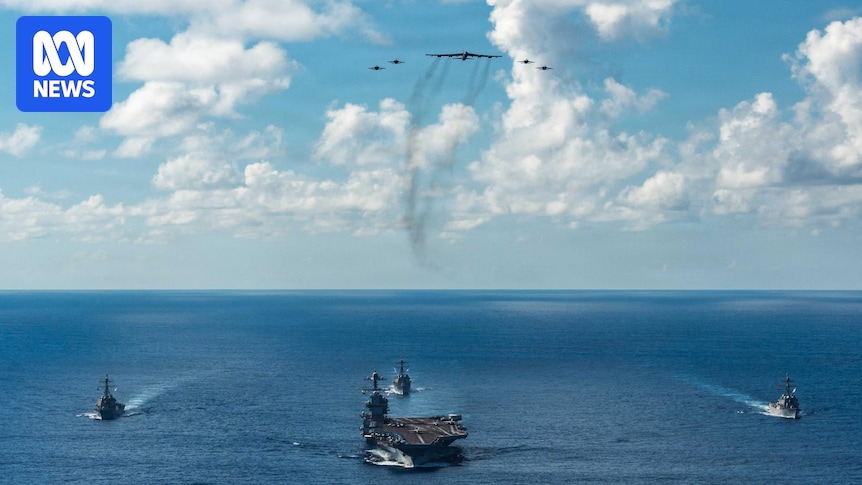
The USS Gerald R. Ford, the United States’ most advanced aircraft carrier, has arrived in the Caribbean, marking a significant escalation in the US military presence near Venezuela. This development comes as President Donald Trump hints at potential discussions with Venezuelan President Nicolás Maduro, despite the ongoing tension between the two nations.
The US Navy announced the arrival of the carrier and other warships as part of what the Trump administration describes as a counter-drug operation. However, many observers view this move as an intensified pressure tactic against Maduro’s government. President Trump, while not providing details, suggested that Venezuela is open to talks, stating, “Venezuela would like to talk.”
Operation Southern Spear: A Show of Force
The USS Gerald R. Ford’s arrival completes what is being described as the largest buildup of US military power in the region in decades. Dubbed ‘Operation Southern Spear,’ the operation now includes nearly a dozen navy ships and approximately 12,000 sailors and marines.
This military buildup coincides with a recent strike by the US military on a small boat in the eastern Pacific Ocean, which the US claims was involved in drug trafficking. The Southern Command released a video of the attack, which reportedly killed three men, though no evidence was provided to support the drug trafficking claims.
“Since early September, such strikes by the US in the Caribbean and eastern Pacific have now killed at least 83 people in 21 attacks.”
Rear Admiral Paul Lanzilotta, commanding the strike group, emphasized the mission’s focus on protecting American security and prosperity against narcoterrorism. Meanwhile, Admiral Alvin Holsey stated that US forces are prepared to combat threats seeking to destabilize the region.
Regional Training Exercises and Diplomatic Tensions
In Trinidad and Tobago, located just 11 kilometers from Venezuela, joint training exercises with the US military have commenced. Trinidad and Tobago’s Foreign Affairs Minister, Sean Sobers, described these exercises as a continuation of efforts to combat violent crime linked to drug trafficking.
These exercises, which include marines stationed aboard US navy ships, have been met with criticism from Venezuela. The Venezuelan government labeled the exercises as aggressive, though it has not commented on the arrival of the USS Gerald R. Ford.
US Army Secretary Dan Driscoll noted that troops have been training in Panama, ready to respond to directives from President Trump and Secretary of Defense Pete Hegseth. Despite the administration’s claims that the military presence aims to curb drug flow into the US, no concrete evidence has been presented to substantiate these assertions.
Strategic Implications and Political Reactions
President Trump has suggested that military actions might expand beyond maritime strikes, with potential land operations to “stop the drugs coming in by land.” Historically, the US has utilized aircraft carriers to project power and deter aggression, raising questions about the strategic intent behind the deployment of the USS Gerald R. Ford.
Some experts argue that while the carrier may not be ideal for combating drug cartels, it serves as a potent symbol of intimidation towards Maduro’s administration. Secretary of State Marco Rubio has reiterated the US stance of not recognizing Maduro as Venezuela’s legitimate leader, accusing his government of facilitating drug trafficking.
“This is the anchor of what it means to have US military power once again in Latin America,” said Elizabeth Dickinson, the International Crisis Group’s senior analyst for the Andes region.
Venezuela’s government, facing accusations of narcoterrorism from the US, has accused Washington of fabricating a conflict. President Maduro has vowed to defend Venezuela against any aggression, rallying support from his party and organizing neighborhood committees to bolster the socialist agenda.
Controversy and Criticism
The US military’s strikes on boats have sparked controversy, with President Trump defending the actions as part of an “armed conflict” with drug cartels. However, regional leaders, the UN human rights chief, and US lawmakers have demanded more transparency regarding the targets and legal justifications for these strikes.
Despite this pushback, Senate Republicans recently blocked legislation that would have restricted Trump’s authority to launch attacks on Venezuela without congressional approval. The debate over US military actions in the region continues to polarize opinions, with experts divided on the potential use of American warplanes against Venezuelan land targets.
As the situation unfolds, the deployment of the USS Gerald R. Ford sends a clear message of US military resolve in Latin America, heightening tensions and prompting widespread concern about the potential for further escalation.






